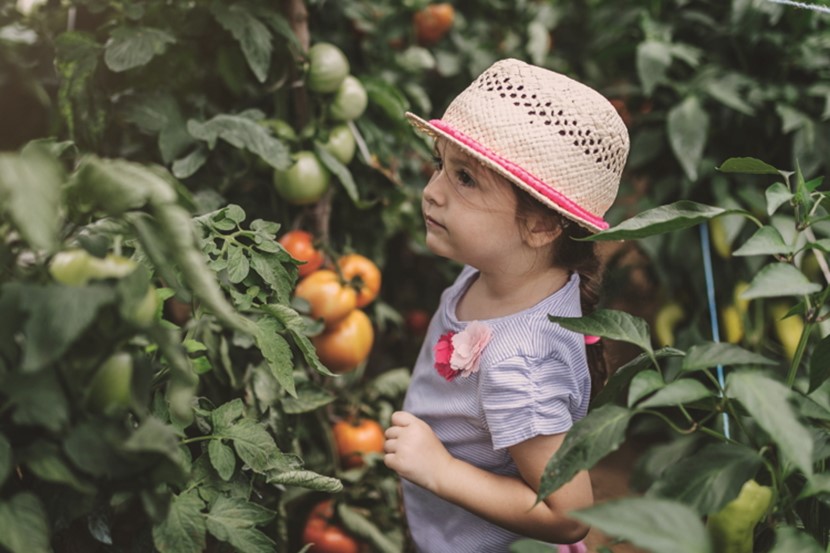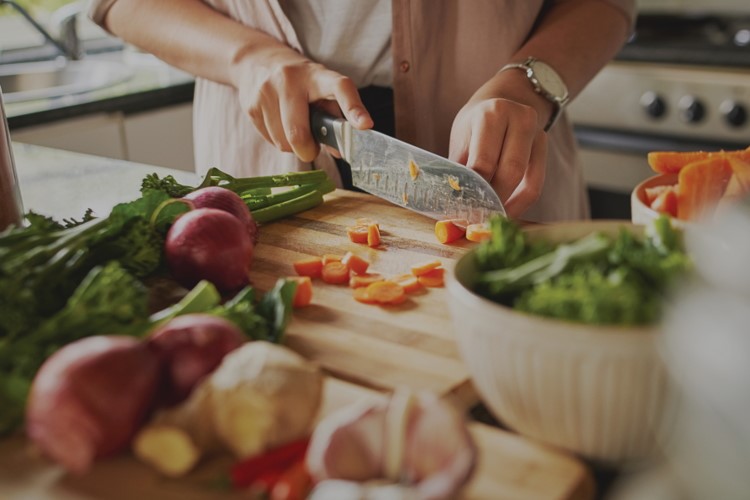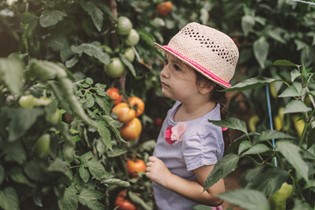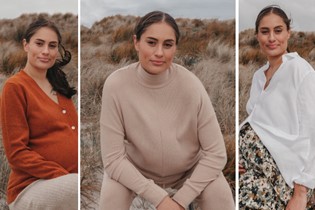Cover your family's nutrition needs with a plant-based diet

OHbaby! Dietitian Jenny Douglas explains how to cover your family’s nutritional bases in a plant-based diet.
Plant-based eating has become increasingly popular due to Netflix documentaries showing improvements in health and sports performance, but also for its potential to help reduce the impact of climate change. Plant-based eating can be as flexible as you want it to be; it all depends on your values and reasons for doing it. A plant-based diet involves eating a variety of foods derived from plant sources, such as legumes, nuts, seeds, vegetables, fruit and wholegrains. It can meet all the nutritional requirements for all ages and stages of life, but does require a certain amount of menu planning to ensure you do it right.
Health benefits
✔ A high vegetable and vegetable-protein diet is rich in nutrients and fibre.
✔ A vegetarian diet can lower the risk of cardiovascular disease and some cancers.
✔ Because it’s likely to be higher in fibre, a plant-based diet can also help with weight management and digestion.
✔ Plant-based eating may help lower your climate impact, but it’s important to remember that diet choice is only one part of the climate picture; your choice of energy-usage, transport, travel and how you shop often play much more significant roles in your carbon footprint.
Babies on plant-based diet
Babies on a plant-based diet should be exclusively breastfed for the first six months of life and breastfeeding continued (with the introduction of solids) until they are around two years or beyond. If Baby cannot be breastfed, then a commercially prepared cow’s milk or soy-based formula is the next best option. For vegan and vegetarian babies, it may be useful to continue commercial formula and/or breastmilk until they’re around two years of age in order to meet their nutritional requirements, rather than moving to an alternative milk when they’re one year old, because alternative milks are often low in calories, protein, fat and calcium. Homemade formulas are not advisable and are potentially dangerous.
Babies are small eaters so take care to ensure you offer plenty of fats, such as plant-based oil and nut butters, for energy at each meal. Fibre in plant-based proteins, such as legumes or in wholegrain breads/cereals, can make baby quite full, so spread your baby’s intake of these evenly over the day and aim for lower fibre grains, such as white rice, quinoa or white/wholemeal breads. Babies need iron daily from the age of six months and this needs to come from food sources not supplements. Plant-based baby foods containing iron include iron-fortified baby cereal, tofu, lentils, beans and green leafy vegetables such as silver beet and spinach.
|
PLANT-BASED DIETS
When it comes to plant-based eating, the saying ‘Different strokes for different folks’ certainly applies. Here’s an outline of what plant-based eating might look like for your family, whether you’re vegan, vegetarian, pescatarian or flexitarian.
|
Plant-based diets
To meet your family’s nutritional needs, plan to include a variety of foods in their diet, such as legumes, vegetables, fruits, wholegrains, nuts and seeds. Some of the nutrients that need more careful attention are iron, calcium, B12, omega-3 and zinc.
Iron
Iron is found in two forms: haem and non-haem iron. Haem iron comes from animal products and is an iron that is easily absorbed by the body. Non-haem iron is found in plant-based foods and is not as readily absorbed, but can still be a good iron source.
Some good vegan/vegetarian sources of iron are:
✔ Legumes, eg lentils, beans, chickpeas
✔ Soy products, eg tofu, tempeh
✔ Nut butters
✔ Egg (if vegetarian)
✔ Iron-fortified cereals, eg fortified baby cereal, Sanitarium Weetbix, Uncle Toby’s Cheerios
✔ Sourdough or wholegrain breads
✔ Dark leafy green vegetables
✔ Alternative meat products, such as Vegie Delights or Impossible Meats.
✔ Brown rice
To aid absorption of plant-based iron it is great to add foods containing vitamin C to meals. For example, adding capsicum, onion and carrot to lentils, or by offering an orange after the meal.
Calcium
Calcium is an important nutrient for bone development and growth. High levels of calcium are found in cow’s milk, yoghurt and cheese. A child needs around three serves of calcium-rich foods each day, which may be one cup of milk, two to three slices of cheese or a pottle of yoghurt.
A vegan child can move to alternative plant-based milks when they’re around two to three years old. As I’ve mentioned, some of these alternative milks contain low levels of calories, calcium, protein and fat, so check the labels! Soy milk is the closest alternative in nutritional value to cow’s milk and has good protein, calcium and fat levels. Rice and oat milks have good caloric value, but are low in protein. Almond and coconut milks are ‘last resort’ milks for younger children as they have very low caloric value, minimal protein and generally poor fortification of calcium. When you’re looking for calcium levels in alternative milks a good rule of thumb is to aim for a milk that offers at least 120mg calcium per 100mls.
Some good vegan or vegetarian sources of calcium are:
✔ Cow’s milk, yoghurt and cheese (if you’re vegetarian)
✔ Calcium fortified soy, rice, oat, almond and coconut milks (ensure they are fortified with 120mg calcium
per 100mls)
✔ Tofu
✔ Fortified soy products, such as calcium-fortified yoghurt, soy custard and soy cheese
✔ Alternative cheese fortified with calcium, eg Angel Foods cheddar
✔ Low-oxalate greens, eg kale, broccoli, bok choy, Brussels sprouts nd cauliflower
Vitamin B12
Vitamin B12 is a nutrient that helps keep the body’s nerve and blood cells healthy. Vitamin B12 is only found in animal products and therefore needs to be found in fortified food products on a vegan diet, or from a supplement.
Some sources of B12 are:
✔ Fortified nutritional yeast, eg Braggs
✔ Fortified alternative milks
✔ Egg (if vegetarian)
✔ Cow’s milk (if vegetarian)
✔ Yeast spread extract eg Marmite, but limit babies’ intake because of its high salt content
Zinc
Zinc is an important nutrient for growth and development, and for the maintenance of a healthy immune system.
Some vegan/vegetarian sources of zinc:
✔ Soy products, such as tempeh
✔ Nuts and seeds
✔ Legumes eg baked beans, lentils
✔ Wheatgerm
✔ Alternative meat products
Omega-3
Fat and omega-3 are important for growth, fat-soluble vitamins and brain development. In a vegan diet it’s important to include a variety of rich sources of alpha linolenic acid (ALA) – an essential omega-3 which can be converted to other omega-3 (DHA and EPA) if fatty fish is not included in the diet.
Food sources rich in ALA:
✔ Ground flaxseeds/linseeds
✔ Walnuts
✔ Chia seeds
✔ Hemp seeds
✔ Flaxseed or canola oil
Fibre alert
Many vegetables and vegetable proteins are high in fibre which can be great for getting things moving in your gut. But fibre can fill up smaller tummies really quickly, meaning babies and young children will not end up eating as much food. High levels of fibre can also interfere with the absorption of iron and calcium. Heavy fibres, such as bran and heavy grainy breads, are not suitable for little children and should be introduced slowly into an older child’s diet. Offer your baby and child small amounts of fibre-containing foods more and more regularly over the day to stop them from feeling too full, and choose slightly lower fibre grains, such as white rice, white or wholemeal bread and infant cereals combined with vegetables, fruit and legumes.
What supplements, and when?
Supplements may be needed if you cannot meet all the nutritional requirements from your plant-based diet. While trying to conceive and during the first 12 weeks of pregnancy you will need folic acid along with iodine, as per the rest of the population. However, it may be harder to meet your iron requirements during the last trimesters of pregnancy, therefore you’ll need iron supplementation. If you’re pregnant, your midwife or GP may also suggest additional vitamin B12, vitamin D (during winter), calcium and omega-3.
For babies who are exclusively breastfed over the winter months and have darker skin tone, a vitamin D supplement is advisable. Vegan families may benefit from vitamin B12 supplements if they’re not regularly using fortified food products.
A plant-based way of eating can work for many families, but even if you do not wish to give up meat completely, you can still enjoy plant-based eating by having a few meat-free meals every week, and by experimenting with vegan or vegetarian recipes. A few vegetarian meals every week can be a great way to improve your family’s health, reduce your climate impact and lower your food bill.
|
WHAT WOULD A NORMAL DAY OF EATING LOOK LIKE FOR A VEGAN CHILD? Breakfast:
Lunch: Afternoon tea: Dinner: Supper: |

Jennifer Douglas is a Registered Dietitian who specialises in nutrition and food allergies and intolerances. She has more than 14 years’ experience working with families who she sees in her Dunedin clinic or via Skype. She also holds baby and family feeding seminars in Dunedin or via virtual link to parenting groups. Find her at jumpstartnutrition.co.nz.

AS FEATURED IN ISSUE 51 OF OHbaby! MAGAZINE. CHECK OUT OTHER ARTICLES IN THIS ISSUE BELOW

















